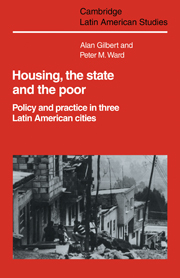Book contents
- Frontmatter
- Contents
- List of figures
- List of tables
- Acknowledgements
- Abbreviations
- 1 Introduction: the research issues and strategy
- 2 Bogotá, Mexico City and Valencia: the social, economic and political backcloth
- 3 Access to land
- 4 Servicing low-income settlements
- 5 Community organization: participation or social control?
- 6 Conclusions
- Appendix 1 The methodology in detail
- Appendix 2 Description of the survey settlements
- Notes
- Bibliography
- Author index
- Subject index
- CAMBRIDGE LATIN AMERICAN STUDIES
2 - Bogotá, Mexico City and Valencia: the social, economic and political backcloth
Published online by Cambridge University Press: 04 August 2010
- Frontmatter
- Contents
- List of figures
- List of tables
- Acknowledgements
- Abbreviations
- 1 Introduction: the research issues and strategy
- 2 Bogotá, Mexico City and Valencia: the social, economic and political backcloth
- 3 Access to land
- 4 Servicing low-income settlements
- 5 Community organization: participation or social control?
- 6 Conclusions
- Appendix 1 The methodology in detail
- Appendix 2 Description of the survey settlements
- Notes
- Bibliography
- Author index
- Subject index
- CAMBRIDGE LATIN AMERICAN STUDIES
Summary
The different responses to housing and servicing in the three cities cannot be adequately understood without examining the nature and policies of the state both at the national and the local level. For land, housing and servicing are only elements in the total relationship between the state and the poor. Without some understanding of recent trends in economic and social change and of state participation in that process, our explanation of policy towards the urban poor is bound to be superficial. For this reason the chapter examines first the broad patterns of economic growth in each country, second, the nature of each country's political and social development and, finally, the economic, social and political characteristics of each city. This resumé is included in the hope that individual state responses to the specific issues of land, housing and servicing for the poor can be related in the later chapters to the wider issue of how the state conceives the whole dynamic and objective of development and change.
The national economies
There are numerous similarities between the Colombian, Mexican and Venezuelan economies. All showed quite high rates of growth during the late sixties and early seventies (table 2). All have a common dependence on the export of primary products, though the nature of the commodity and its role in the national development process differs.
- Type
- Chapter
- Information
- Housing, the State and the PoorPolicy and Practice in Three Latin American Cities, pp. 28 - 60Publisher: Cambridge University PressPrint publication year: 1985



